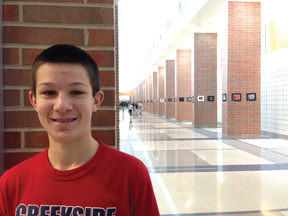 Native American sports mascots have been around for nearly a century, yet the debate over whether they should be allowed has come and gone. However, one name in particular remains under constant fire: the “Washington Redskins.” The NFL franchise has endured a heralded 81-year tenure with the name. Twenty-seven head coaches. Five hundred and eighty seven total wins. Three Super Bowl rings. But now, the history of the Washington Redskins name is in jeopardy.
Native American sports mascots have been around for nearly a century, yet the debate over whether they should be allowed has come and gone. However, one name in particular remains under constant fire: the “Washington Redskins.” The NFL franchise has endured a heralded 81-year tenure with the name. Twenty-seven head coaches. Five hundred and eighty seven total wins. Three Super Bowl rings. But now, the history of the Washington Redskins name is in jeopardy.
Several Native American tribes have been adamant about changing the name “Redskins,” finding it offensive to their race and calling it a slur. Even President Obama got into the mix and cited “real legitimate concerns” associated with the mascot. But Redskins’ owner Dan Snyder still stands strong in his position to keep the name in place.
With the pressure continually piling up on Snyder, he recently released a personal letter to the public addressing the numerous problems related to his franchise’s name. He wrote that while he recognizes the concerns poised by certain people, he views the mascot as a symbol of “strength, courage, pride and respect.” And to be honest, I agree with him.
While I do respect the opinions of those who discourage the name, I believe that the name should not be changed.
Because deep under the media chaos and the outspoken tribes lies the shocking truth: That the majority of Native Americans don’t find the name offensive. Let me explain.
Native Americans make up 1 percent of the entire U.S. population; and of that percentage, 90 percent said they do not find the name “Redskins” offensive, according a survey done by the Annenberg Public Policy Center. But if hardly any Native Americans find the name offensive, then why is it such a big issue? It’s because the rest of America has spoken. The whites, the African-Americans, the Asians—everybody. You aren’t offended, but we think you should be. So we’ll be offended for you.
Aside from a couple of opposing tribes, the majority of the Native American backing has come from other races, primarily whites. The only reason this “issue” is receiving so much attention is because it’s hard to stop a train when Bob Costas, Peter King, President Obama and more are all on board.
The bottom line is that other races don’t dictate what is and isn’t racist toward another group. If the Native Americans themselves aren’t offended, then the rest of us shouldn’t be.
Second, Native Americans are a minority. As stated earlier, they make up 1 percent of the U.S. population. And that’s not to diminish any value from that 1 percent, but you have to realize that 1 percent is still only, well, 1 percent. But NFL commissioner Roger Goodell said that if “even one person is offended” we need to “listen.” Really?
Some atheists find religious names such as the New Orleans Saints or the Los Angeles Angels offensive. Others claim the Washington Wizards promotes paganism. Hurricanes and Tornadoes have devastated communities and taken lives. Sharks eat people nearly every year. Pirates violently raid ships and live to steal. Spartans and Trojans were brutal warriors in the ancient times.
Some people are afraid of Spiders or Snakes or Thunder or Lightning. Yellow Jackets sting on a daily basis. Irish people might be offended because Notre Dame’s mascot is the “Fighting Irish.” Yet all of these mascots remain prominent. Why? Because the minority doesn’t rule. And it shouldn’t start now.
So despite the constant barrage of the “Redskins” name and other Native American sports mascots, they should remain unchanged. The reality is that few Native Americans are actually offended by the names, and if they were altered, it would signify a drastic change in the meaning of representation.
It is a slippery slope, and it is one that sports teams and schools across America should not be forced to fall down.
The views in this column do not necessarily reflect the views of the HiLite staff. Reach Ryan Woock at [email protected].




























![Keep the New Gloves: Fighter Safety Is Non-Negotiable [opinion]](https://hilite.org/wp-content/uploads/2024/12/ufcglovescolumncover-1200x471.png)
















































![Review: “We Live in Time” leaves you wanting more [MUSE]](https://hilite.org/wp-content/uploads/2024/12/IMG_6358.jpg)
![Review: The premise of "Culinary Class Wars" is refreshingly unique and deserving of more attention [MUSE]](https://hilite.org/wp-content/uploads/2024/12/MUSE-class-wars-cover-2.png)
![Introducing: "The Muses Who Stole Christmas," a collection of reviews for you to follow through winter [MUSE]](https://hilite.org/wp-content/uploads/2024/12/winter-muse-4.gif)
![Review: "Meet Me Next Christmas" is a cheesy and predictable watch, but it was worth every minute [MUSE]](https://hilite.org/wp-content/uploads/2024/11/AAAAQVfRG2gwEuLhXTGm3856HuX2MTNs31Ok7fGgIVCoZbyeugVs1F4DZs-DgP0XadTDrnXHlbQo4DerjRXand9H1JKPM06cENmLl2RsINud2DMqIHzpXFS2n4zOkL3dr5m5i0nIVb3Cu3ataT_W2zGeDAJNd_E-1200x884.jpg)
![Review: "Gilmore Girls", the perfect fall show [MUSE]](https://hilite.org/wp-content/uploads/2024/11/gilmore-girls.png)
![Review in Print: Maripaz Villar brings a delightfully unique style to the world of WEBTOON [MUSE]](https://hilite.org/wp-content/uploads/2023/12/maripazcover-1200x960.jpg)
![Review: “The Sword of Kaigen” is a masterpiece [MUSE]](https://hilite.org/wp-content/uploads/2023/11/Screenshot-2023-11-26-201051.png)
![Review: Gateron Oil Kings, great linear switches, okay price [MUSE]](https://hilite.org/wp-content/uploads/2023/11/Screenshot-2023-11-26-200553.png)
![Review: “A Haunting in Venice” is a significant improvement from other Agatha Christie adaptations [MUSE]](https://hilite.org/wp-content/uploads/2023/11/e7ee2938a6d422669771bce6d8088521.jpg)
![Review: A Thanksgiving story from elementary school, still just as interesting [MUSE]](https://hilite.org/wp-content/uploads/2023/11/Screenshot-2023-11-26-195514-987x1200.png)
![Review: "When I Fly Towards You", cute, uplifting youth drama [MUSE]](https://hilite.org/wp-content/uploads/2023/09/When-I-Fly-Towards-You-Chinese-drama.png)
![Postcards from Muse: Hawaii Travel Diary [MUSE]](https://hilite.org/wp-content/uploads/2023/09/My-project-1-1200x1200.jpg)
![Review: "Ladybug & Cat Noir: The Movie," departure from original show [MUSE]](https://hilite.org/wp-content/uploads/2023/09/Ladybug__Cat_Noir_-_The_Movie_poster.jpg)
![Review in Print: "Hidden Love" is the cute, uplifting drama everyone needs [MUSE]](https://hilite.org/wp-content/uploads/2023/09/hiddenlovecover-e1693597208225-1030x1200.png)
![Review in Print: "Heartstopper" is the heartwarming queer romance we all need [MUSE]](https://hilite.org/wp-content/uploads/2023/08/museheartstoppercover-1200x654.png)




